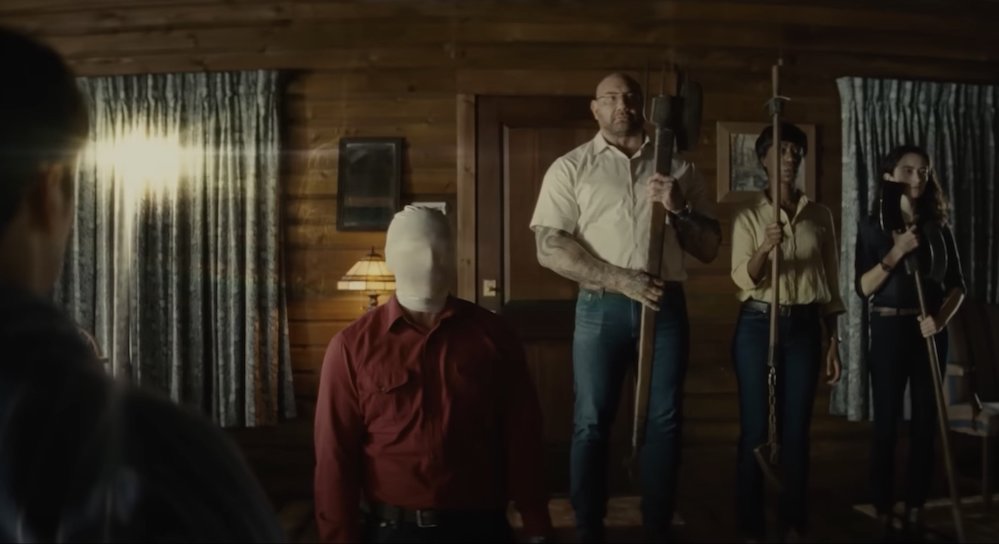It’s safe to say that M. Night Shyamalan is back. After spending a long time as an unworthy punching bag – how many racist jokes did you hear about his name and how he’s obsessed with Plot Twists over the past two decades? – and the unrealistic expectations of being “The Next Spielberg” as well as coming out of the gates with Sixth Sense, Unbreakable, and Signs, it seems like popular opinion has swung back around to appreciating his unique style and substance. The hype around him was so sky high that it gave him an air of prestige that was never really fair to put on him. He was mistaken for what now would be considered an “elevated” horror filmmaker when in reality he’s always been an exceptionally talented director of pure, unpretentious and sometimes silly genre fare that explores ideas and themes that tickle his personal fancy. Knock at the Cabin is exactly that – a tense, but sometimes goofy, film about family, love and the apocalypse.
Based on the novel The Cabin at the End of the World by Paul G. Tremblay, Knock at the Cabin depicts four strangers breaking into a family’s cabin vacation and demanding a sacrifice to prevent the end of the world. The family, fathers Eric and Andrew and their daughter Wen, are told that one of them must die by the hand of their other family members or else the end times will begin. The two adults are tied up and are forced to witness the invaders’ strange rituals involving their own self-sacrifice and news footage that shows the foretold events of armageddon.

Everyone in the film is great, but Bautista in particular puts in career best work as the tearful, genuinely troubled leader of the home invaders.
online pharmacy purchase ivermectin online best drugstore for you
I’ve been critical of the common assessment that Bautista is somehow a vastly superior actor than other pro wrestlers turned actors – and I stand by the fact that others like John Cena and the early era of Dwayne Johnson’s filmographies are nothing to scoff at – but here he’s giving such a nuanced and vulnerable performance that it’s impossible not to be awed by how great he is at this. It’s not that much of an exaggeration to say that a solid 10-15% of the film is in close-up or extreme close-up of his face or eyes, and he completely sells his character’s conflict, resolve and heartache in every frame.
There’s a sensitivity and sweetness in his portrayal of Leonard that makes the film’s home invasion and apocalyptic setup unnerving. His sincerity is more menacing than his massive frame at times.
If Bautista is the film’s standout performance, then Jonathan Groff is the anchor that makes the film work.
Playing Eric as the more genteel, naive and persuadable of the central couple, he’s given the most legwork to do in terms of making the film’s beating heart and emotional resonance work. By the end of the film he’s practically saddled with carrying the film’s climactic moments and his character arc is the backbone of the film.
Ben Aldridge as the more cynical, defensive Andrew is wonderful opposite Groff, with the two having a delightful chemistry while still being unique characters with vastly different mindsets.
The conflict between the two, one defiant and unwavering in his cynicism towards the strangers’ proposal and the other slowly becoming more intrigued and accepting is the essential conflict of the film, and it would not work as a story without their pitch perfect performances playing off of each other.

Shyamalan is one of the rare American filmmakers working today that truly believes in the visual art of cinema. He’s always been an exceptionally talented filmmaker, and here he’s using different aesthetics (right down to using vintage cameras of different eras) to tell his story both in the present day and the myriad flashbacks that occur throughout the film. He’s using the camera in different ways, sometimes hyper stylized – there are a few bits of violence that look like they could be from a Leigh Whannel or Gareth Evans film – but there is plenty of reserved filmmaking as well. The aforementioned close ups on Bautista, the various ways in which he shoots the four strangers to visually communicate their character, and the slow, fluid camera movements throughout the cabin that aid in grounding the setting’s geography are all in Shyamalan’s bag of tricks throughout the movie. The editing, jumping back and forth through time to show Andrew and Eric’s relationship growth over the years, is arguably the film’s strongest element, with the story always flowing together even when the narrative timeline is changing; each flashback is folded perfectly into the central plot and gives the audience exactly the right amount of backstory to make each successive sequence land harder.
It’s been a fascinating recent run for Shyamalan over the past decade or so. Basically every film he’s made since The Visit has been, at the very least, fascinating to dissect if not outright great. Knock in the Cabin falls into that latter category, working as a thematic companion piece to Signs as he once again examines the conflict between grief and faith through high concept schlocky genre movies. I’d go so far as to say this is his best film since Signs, and a firm statement that Shyamalan is one of our last, most interesting true auteurs still working in the industry.






